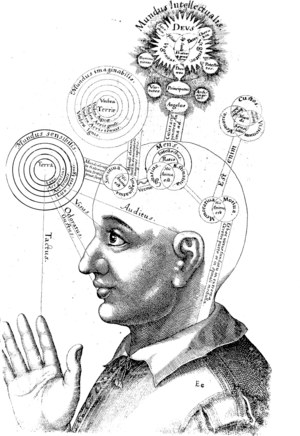Consciousness
Consciousness is a state of awareness of oneself, an object outside oneself, or something within oneself. The use of the term among Marxists can refer to either individual consciousness or social consciousness, which can give rise to ideology and systems of thought. The interaction between human consciousness and material existence is an important philosophical topic within Marxism.
Concept
One of the implications of Marx's model of society is that human beliefs and consciousness are an effect - not a cause - of their social existence. Marx explains,
"It is not the consciousness of men that determines their existence, but their social existence that determines their consciousness. [...]
"Just as one does not judge an individual by what he thinks about himself, so one cannot judge such a period of transformation by its consciousness, but, on the contrary, this consciousness must be explained from the contradictions of material life, from the conflict existing between the social forces of production and the relations of production."[1]
Marx did not see human consciousness as something entirely passive. Human consciousness also plays a role in the material life of man and its reproduction:
"A spider conducts operations that resemble those of a weaver, and a bee puts to shame many an architect in the construction of her cells. But what distinguishes the worst architect from the best of bees is this, that the architect raises his structure in imagination before he erects it in reality. At the end of every labour-process, we get a result that already existed in the imagination of the labourer at its commencement. He not only effects a change of form in the material on which he works, but he also realises a purpose of his own that gives the law to his modus operandi, and to which he must subordinate his will."[2]
Marx's idea of human consciousness built upon earlier beliefs, such as those of socialist Robert Owen, that the consciousness and character of man are formed by his surrounding conditions.
"From the earliest ages it has been the practice of the world to act on the supposition that each individual man forms his own character, and that therefore he is accountable for all his sentiments and habits, and consequently merits reward for some and punishment for others. Every system which has been established among men has been founded on these erroneous principles. When, however, they shall be brought to the test of fair examination, they will be found not only unsupported, but in direct opposition to all experience, and to the evidence of our senses. [...]
"Let it not, therefore, be longer said that evil or injurious actions cannot be prevented, or that the most rational habits in the rising generation cannot be universally formed. In those characters which now exhibit crime, the fault is obviously not in the individual, but the defects proceed from the system in which the individual was trained. Withdraw those circumstances which tend to create crime in the human character, and crime will not be created.[3]
Alexander Bogdanov, Russian Marxist and Old Bolshevik, saw religious ideology as developing from specific material conditions and social relations:
"Religious thinking is inextricably linked with authoritarian labor relations (leadership -- execution or power -- submission), of which arose and reflects them. It is characterized by the creation of power fetishes and the demand from people for obedience, obedience to them. These are idealized images, generated by fantasy based on the real domination of the "authorities" over people in their social life. In a word, religious thinking is authoritarian, and only. [...]
"Hence, the static nature of religious thinking -- with its unchanging and immobile, stopping along the path of cognition and practice -- clearly arises. Faith, not allowing criticism of one form or another of life, one truth or another, giving them absolute value, does not allow, therefore, their development, and even more so - a radical change, a higher substitution. This is a particularly important feature of religious thinking, which makes it possible to recognize it in all disguises. And it resorts to disguise very often in our times, in an era of unprecedented victories of scientific thinking."[4]
Class consciousness
A materialist understanding of class is known by Marxists as 'class consciousness'. This understanding is the knowledge of one's own position in the economic hierarchy, and the acceptance of the interests which therefore benefit the individual. The term is most often used to describe the working class, or elements of it, becoming aware of their own exploitation and working to oppose it in unity with their fellow workers, but it can also be used to describe the self-awareness of the bourgeoisie of their superior position in society and their efforts to maintain the present hierarchy. It is often contrasted with its inverse, 'false consciousness', which describes the lack of this knowledge causing the worker to labour contrary to his own interests as a member of the oppressed class (for instance through vocal support of the ruling classes and existing power structures).
References
- ↑ Marx, Karl. A Contribution to the Critique of Political Economy, 1859.
- ↑ Marx, Karl. Capital vol.1, ch.7, 1867.
- ↑ Owen, Robert. A New View of Society, 1816.
- ↑ Bogdanov, Alexander. Faith and Science, 1910. (Translation mine - Ed.)
